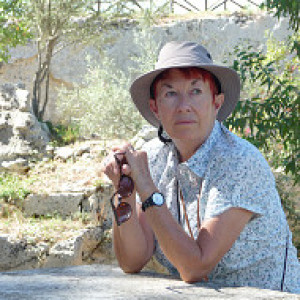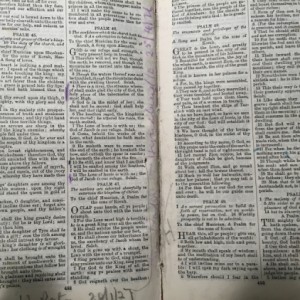Remembering family
I was tidying today - dusting, even, as I have a Russian musician staying with me tomorrow - when I came across my maternal grandfather's service bible, tucked away on a high bookshelf for safety. I've had it for more years than I can recall - perhaps since he died when I was a young teenager - but somehow the preponderance of World War 1 memories at this time made it seem more pertinent. The photo shows the canvas cover, amazingly well-preserved, with his name and regiment carefully inked on it. I know that he was a crack shot, and that he was a member of the Cameronians Territorial unit several years before war broke out - perhaps immediately on his return from his time as a teacher in Pretoria, where my mother was born in 1911. I also know that he was desperate to go to the Front with his regiment, but that he was declared medically unfit because of a recurring stomach ulcer. My mother had a very early memory of finding my grandmother weeping with relief in the kitchen when she heard the news. At some point he was posted to Deal, on the South Coast, where he instructed new soldiers in gas mask drill; he attributed the bronchitis that plagued him till his death in the late 1950s to the day he took his own gas mask off too soon in a gas chamber.
The inside pages of the bible are heavily annotated in a manner that makes me think he went on using it well into the 1920s. My extra photo is of a couple of pages that demonstrate this - the Psalms are especially noticeably marked. I seem to recall he was a kirk elder and a Sunday School superintendent - so presumably was every bit as involved in his church as I seem to be in my own. Heaven knows what he'd have said if he knew I was a Pisky - this from a piece I found about the Cameronians: The original regiment comprised hill men and all were driven by religious fervour. They were products of an angry and disruptive age. Those who signed the National Covenant felt that they were doing for the rights of the individual what their forefathers had achieved for the freedom of their country by signing the Declaration of Arbroath. At heart what they demanded was the right to worship as they chose without interference from the king, his appointees, or from an episcopacy. The most zealous of them became followers of Richard Cameron, the Lion of the Covenant. It was from him that the regiment eventually took it name.
So much history, so much becoming gradually forgotten as the generations pass. So today, here's a wee bit, entrusted to the ether ...


Comments
Sign in or get an account to comment.


